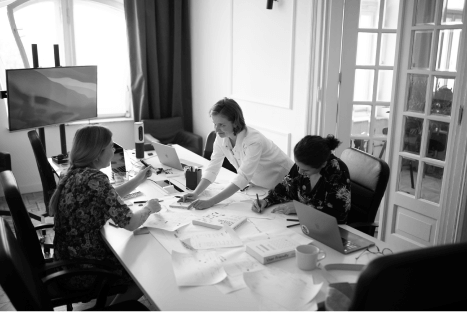
Discover the product piece by piece
Date 01 June 2021
If you wonder if there is a magical way to save money when you build a digital product... I can say: YES there is! It comes down to introducing "excessive" caution.
The more assumptions you verify before development begins, the less money you'll throw in the trash. This is a brief description of the process professionally known as product discovery. During this process, hypotheses are constructed and later experiments are conducted. By doing so, you reduce the risk of spending your budget unnecessarily on something that may not turn out to be right.
Imagine you're building an app to make it easy to find a trustworthy psychologist. Let's call it "Find a Psychologist". On the surface, it seems like a simple task - let's make a database of psychologists and a search engine. However, in the course of product discovery you may find, e.g:
- That experienced psychologists have so many jobs that only the young and inexperienced want to advertise in your app,
- That clients prefer to make their choice of psychotherapist based on a self-presentation video rather than being guided by a photo,
- That psychologists expect their patients to make appointments on the same day of the week at a consistent time.
The product discovery stage allows you to identify as many of these barriers as possible. Once you identify them, you have a chance to create a digital product that is more aligned with the users' needs and the market situation.
Let's go back to the example. Here's a list of just a few issues and ideas to check out before you start writing code for your "Find a Psychologist" app:
- How do people currently seek out a psychologist? Do they use referrals? Or maybe they are ashamed to ask anyone for advice and prefer to search anonymously? Or maybe it depends on where they live?
- Do people look for a psychologist on the internet? Or are they looking more for psychological counselling centres?
- Do psychologists use software to manage their calendars? Or do they prefer to record appointments in a notebook?
- Is it possible to make one appointment to see a psychologist, or do you have to make several right away?
- What are the factors that guide people when choosing a psychologist? Self-presentation, experience, education? Or do they want to see a photo or video to assess temperament and personality fit?
- Is the data the application will process sensitive in nature? Are they not subject to restrictions due to specific laws?
- Do psychologists have time for new clients? Or do they have full calendars?
- Do psychologists need a prior interview before they invite clients?
- Are psychologists willing to conduct sessions remotely, or do they prefer in-person meetings? What are their clients' expectations in this regard?
Experienced product teams, through prototypes, surveys and more advanced methods, are able to test even 10-20 hypotheses per week. So if you can test in a week something that would take months of development, you can count the savings in tens or hundreds of thousands of dollars.
Experienced product teams, through prototypes, surveys and more advanced methods, are able to test even 10-20 hypotheses per week. So if you can test in a week something that would take months to program, you can count the savings in tens or hundreds of thousands of dollars. On the other hand, if you attempt to build a product without the product discovery phase, then you are de facto testing a ready-made product. Then must be ready to face the risk of customer dissatisfaction. The cost of changes will consume much more resources and time than the resources you spend on the product discovery phase.
Importantly, prototypes are only shown to a narrowed audience, so you don't have to fear that it will negatively impact your brand's reputation. It's not something you can release as a finished product that your company brags about and sells.
Later in this article, you'll see that the approach of discovery, taking small steps, and quick turnarounds in decisions should follow you throughout the life of your product.
Insights
View AllLet us inspire you.
- InsightProduct discovery advice: Own the product, not the idea
![Discover the product piece by piece]()
- InsighteBOOK: How to build products that make money
![Discover the product piece by piece]()
- InsightTalk to the user! How to conduct IDI research
![Discover the product piece by piece]()


